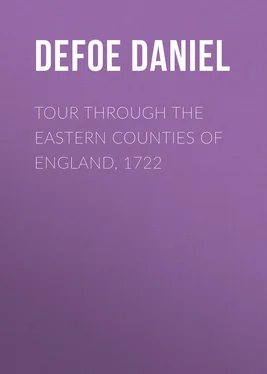Daniel Defoe - Tour through the Eastern Counties of England, 1722
Здесь есть возможность читать онлайн «Daniel Defoe - Tour through the Eastern Counties of England, 1722» — ознакомительный отрывок электронной книги совершенно бесплатно, а после прочтения отрывка купить полную версию. В некоторых случаях можно слушать аудио, скачать через торрент в формате fb2 и присутствует краткое содержание. Жанр: foreign_antique, foreign_prose, на английском языке. Описание произведения, (предисловие) а так же отзывы посетителей доступны на портале библиотеки ЛибКат.
- Название:Tour through the Eastern Counties of England, 1722
- Автор:
- Жанр:
- Год:неизвестен
- ISBN:нет данных
- Рейтинг книги:3 / 5. Голосов: 1
-
Избранное:Добавить в избранное
- Отзывы:
-
Ваша оценка:
- 60
- 1
- 2
- 3
- 4
- 5
Tour through the Eastern Counties of England, 1722: краткое содержание, описание и аннотация
Предлагаем к чтению аннотацию, описание, краткое содержание или предисловие (зависит от того, что написал сам автор книги «Tour through the Eastern Counties of England, 1722»). Если вы не нашли необходимую информацию о книге — напишите в комментариях, мы постараемся отыскать её.
Tour through the Eastern Counties of England, 1722 — читать онлайн ознакомительный отрывок
Ниже представлен текст книги, разбитый по страницам. Система сохранения места последней прочитанной страницы, позволяет с удобством читать онлайн бесплатно книгу «Tour through the Eastern Counties of England, 1722», без необходимости каждый раз заново искать на чём Вы остановились. Поставьте закладку, и сможете в любой момент перейти на страницу, на которой закончили чтение.
Интервал:
Закладка:
On this shore also are taken the best and nicest, though not the largest, oysters in England; the spot from whence they have their common appellation is a little bank called Woelfleet, scarce to be called an island, in the mouth of the River Crouch, now called Crooksea Water; but the chief place where the said oysters are now had is from Wyvenhoe and the shores adjacent, whither they are brought by the fishermen, who take them at the mouth of that they call Colchester water and about the sand they call the Spits, and carry them up to Wyvenhoe, where they are laid in beds or pits on the shore to feed, as they call it; and then being barrelled up and carried to Colchester, which is but three miles off, they are sent to London by land, and are from thence called Colchester oysters.
The chief sort of other fish which they carry from this part of the shore to London are soles, which they take sometimes exceeding large, and yield a very good price at London market. Also sometimes middling turbot, with whiting, codling and large flounders; the small fish, as above, they sell in the country.
In the several creeks and openings, as above, on this shore there are also other islands, but of no particular note, except Mersey, which lies in the middle of the two openings between Malden Water and Colchester Water; being of the most difficult access, so that it is thought a thousand men well provided might keep possession of it against a great force, whether by land or sea. On this account, and because if possessed by an enemy it would shut up all the navigation and fishery on that side, the Government formerly built a fort on the south-east point of it; and generally in case of Dutch war, there is a strong body of troops kept there to defend it.
At this place may be said to end what we call the Hundreds of Essex – that is to say, the three Hundreds or divisions which include the marshy country, viz., Barnstable Hundred, Rochford Hundred, and Dengy Hundred.
I have one remark more before I leave this damp part of the world, and which I cannot omit on the women’s account, namely, that I took notice of a strange decay of the sex here; insomuch that all along this country it was very frequent to meet with men that had had from five or six to fourteen or fifteen wives; nay, and some more. And I was informed that in the marshes on the other side of the river over against Candy Island there was a farmer who was then living with the five-and-twentieth wife, and that his son, who was but about thirty-five years old, had already had about fourteen. Indeed, this part of the story I only had by report, though from good hands too; but the other is well known and easy to be inquired into about Fobbing, Curringham, Thundersly, Benfleet, Prittlewell, Wakering, Great Stambridge, Cricksea, Burnham, Dengy, and other towns of the like situation. The reason, as a merry fellow told me, who said he had had about a dozen and a half of wives (though I found afterwards he fibbed a little) was this: That they being bred in the marshes themselves and seasoned to the place, did pretty well with it; but that they always went up into the hilly country, or, to speak their own language, into the uplands for a wife. That when they took the young lasses out of the wholesome and fresh air they were healthy, fresh, and clear, and well; but when they came out of their native air into the marshes among the fogs and damps, there they presently changed their complexion, got an ague or two, and seldom held it above half a year, or a year at most; “And then,” said he, “we go to the uplands again and fetch another;” so that marrying of wives was reckoned a kind of good farm to them. It is true the fellow told this in a kind of drollery and mirth; but the fact, for all that, is certainly true; and that they have abundance of wives by that very means. Nor is it less true that the inhabitants in these places do not hold it out, as in other countries, and as first you seldom meet with very ancient people among the poor, as in other places we do, so, take it one with another, not one-half of the inhabitants are natives of the place; but such as from other countries or in other parts of this country settle here for the advantage of good farms; for which I appeal to any impartial inquiry, having myself examined into it critically in several places.
From the marshes and low grounds being not able to travel without many windings and indentures by reason of the creeks and waters, I came up to the town of Malden, a noted market town situate at the conflux or joining of two principal rivers in this county, the Chelm or Chelmer, and the Blackwater, and where they enter into the sea. The channel, as I have noted, is called by the sailors Malden Water, and is navigable up to the town, where by that means is a great trade for carrying corn by water to London; the county of Essex being (especially on all that side) a great corn county.
When I have said this I think I have done Malden justice, and said all of it that there is to be said, unless I should run into the old story of its antiquity, and tell you it was a Roman colony in the time of Vespasian, and that it was called Camolodunum. How the Britons, under Queen Boadicea, in revenge for the Romans’ ill-usage of her – for indeed they used her majesty ill – they stripped her naked and whipped her publicly through their streets for some affront she had given them. I say how for this she raised the Britons round the country, overpowered, and cut in pieces the Tenth Legion, killed above eighty thousand Romans, and destroyed the colony; but was afterwards overthrown in a great battle, and sixty thousand Britons slain. I say, unless I should enter into this story, I have nothing more to say of Malden, and, as for that story, it is so fully related by Mr. Camden in his history of the Romans in Britain at the beginning of his “Britannia,” that I need only refer the reader to it, and go on with my journey.
Being obliged to come thus far into the uplands, as above, I made it my road to pass through Witham, a pleasant, well-situated market town, in which, and in its neighbourhood, there are as many gentlemen of good fortunes and families as I believe can be met with in so narrow a compass in any of the three counties of which I make this circuit.
In the town of Witham dwells the Lord Pasely, oldest son of the Earl of Abercorn of Ireland (a branch of the noble family of Hamilton, in Scotland). His lordship has a small, but a neat, well-built new house, and is finishing his gardens in such a manner as few in that part of England will exceed them.
Nearer Chelmsford, hard by Boreham, lives the Lord Viscount Barrington, who, though not born to the title, or estate, or name which he now possesses, had the honour to be twice made heir to the estates of gentlemen not at all related to him, at least, one of them, as is very much to his honour, mentioned in his patent of creation. His name was Shute, his father a linendraper in London, and served sheriff of the said city in very troublesome times. He changed the name of Shute for that of Barrington by an Act of Parliament obtained for that purpose, and had the dignity of a baron of the kingdom conferred on him by the favour of King George. His lordship is a Dissenter, and seems to love retirement. He was a member of Parliament for the town of Berwick-upon-Tweed.
On the other side of Witham, at Fauburn, an ancient mansion house, built by the Romans, lives Mr. Bullock, whose father married the daughter of that eminent citizen, Sir Josiah Child, of Wanstead, by whom she had three sons; the eldest enjoys the estate, which is considerable.
It is observable, that in this part of the country there are several very considerable estates, purchased and now enjoyed by citizens of London, merchants, and tradesmen, as Mr. Western, an iron merchant, near Kelendon; Mr. Cresnor, a wholesale grocer, who was, a little before he died, named for sheriff at Earl’s Coln; Mr. Olemus, a merchant at Braintree; Mr. Westcomb, near Malden; Sir Thomas Webster at Copthall, near Waltham; and several others.
Читать дальшеИнтервал:
Закладка:
Похожие книги на «Tour through the Eastern Counties of England, 1722»
Представляем Вашему вниманию похожие книги на «Tour through the Eastern Counties of England, 1722» списком для выбора. Мы отобрали схожую по названию и смыслу литературу в надежде предоставить читателям больше вариантов отыскать новые, интересные, ещё непрочитанные произведения.
Обсуждение, отзывы о книге «Tour through the Eastern Counties of England, 1722» и просто собственные мнения читателей. Оставьте ваши комментарии, напишите, что Вы думаете о произведении, его смысле или главных героях. Укажите что конкретно понравилось, а что нет, и почему Вы так считаете.












